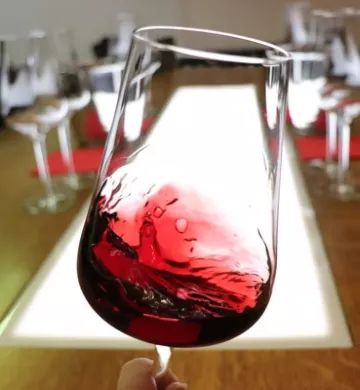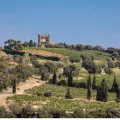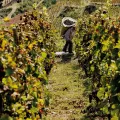
The secrets of Rhone Valley wines revealed!
The Rhône Valley, an emblematic wine-growing region in south-eastern France, is renowned for its exceptional wines, which attract wine-lovers from all over the world. Crossing a variety of landscapes, from rugged mountains to sun-drenched plains, this valley offers an incomparable wealth of vineyards. In this article, we explore the different wine appellations of the Rhône Valley, highlighting their unique characteristics and the estates that produce them. Whether you're a seasoned connoisseur or a curious novice, join us as we dive into the captivating world of Rhône Valley wines.
Rhône Valley wine regions
Northern Rhône Valley
Main appellations
Northern Rhône Valley wines are distinguished by their finesse and complexity. Among the most famous appellations is AOC Condrieu, famous for its white wines made from Viognier grapes, rich in floral and fruity aromas. AOC Hermitage produces powerful reds and complex whites, while AOC Crozes-Hermitage offers more affordable but high-quality wines.
Dominant grape varieties
The main grape varieties in this region include Syrah for red wines, and Marsanne and Roussanne for white wines.
Wine characteristics
Red wines are generally full-bodied, spicy and deep, while white wines are well-balanced, combining fatness and liveliness. The granite terroir and special climatic conditions give the wines of this region their unique character.

Southern Rhône Valley
Main appellations
The Southern Rhône Valley is renowned for its generous, full-bodied wines. Famous appellations include AOC Châteauneuf-du-Pape, renowned for its robust, complex wines, and AOC Gigondas, producing vigorous red wines. Other notable appellations include AOC Vacqueyras, AOC Tavel and AOC Lirac.
Dominant grape varieties
The main grape varieties in this region include Grenache, Syrah and Mourvèdre for red wines, and Grenache blanc, Clairette and Bourboulenc for white wines.
Wine characteristics
Red wines are often full-bodied, spicy and rich in ripe fruit aromas. White wines are fresh and floral, while rosés are fruity and structured. The Mediterranean climate and varied soils, from rounded pebbles to calcareous clay, play a crucial role in the quality of these wines.
Types of wine produced
Red wines
The Rhône Valley is best known for its red wines. These wines vary in style, from powerful vins de garde to lighter, fruitier reds. Main grape varieties include Syrah in the north and Grenache in the south.
White wines
The white wines of the Rhône Valley, although less numerous than the reds, are just as impressive. They are often rich, full-bodied and aromatic, made from grape varieties such as Marsanne, Roussanne and Viognier.
Rosé wines
Rosé wines from the Rhône Valley, such as those from AOC Tavel, are renowned for their structure and fruity aromas. They're the perfect accompaniment to summer cuisine.
Sweet natural wines
The Rhône Valley also produces vins doux naturels, such as AOC Rasteau and AOC Muscat de Beaumes-de-Venise, appreciated for their sweetness and intense aromas.
Sparkling wines
Although less well-known, sparkling wines such as Clairette de Die offer a refreshing alternative to the region's other wines.
Terroir and climate
Soil types
The diversity of soils in the Rhône Valley contributes greatly to the variety and quality of our wines. Granitic, chalky, clayey and pebbly soils all contribute unique characteristics to the wines produced.
Influence of climate
Climate also plays a crucial role, with Mediterranean influences in the south and continental influences in the north. These climatic conditions favor optimal ripening of the grapes, influencing the aromas and structure of the wines.
Producers and wineries
The Rhône Valley is also renowned for its exceptional estates, which contribute to the renown of its wines. Among them, Mouton Père et Fils offers elegant wines that capture the essence of the local terroir. Domaine Pierre Gaillard is famous for its expressive, well-structured wines, while Le Caveau du Château combines tradition and modernity in its productions.
Domaine Christophe Semaska stands out for its wines of character, reflecting the richness of the region, and Domaine Eymin Tichoux produces authentic, refined wines. Domaine de Corps de Loup offers wines that are the fruit of meticulous and passionate work.
Les Vins de Vienne is the result of a unique collaboration between three talented winemakers, while Domaine Christophe Pichon is renowned for its powerful, well-balanced wines. Cave de Tain is a cooperative winery that produces remarkable wines representative of the terroir.
Domaine Lionnet perpetuates a family tradition with elegant wines, and Delas Frères is famous for its prestigious cuvées. Finally, Caveau M. Chapoutier is synonymous with excellence and innovation in the wine world.

Wine history and tradition
Origins and evolution
Viticulture in the Rhône Valley dates back to antiquity, with strong Roman influences. Over the centuries, the region has developed a rich winemaking tradition, now recognized worldwide.
Cultural influence
Rhône Valley wines are not only a terroir product, but also a key element of local culture, contributing to the region's influence and attracting visitors from all over the world.
Conclusion The Rhône Valley, with its diverse appellations, varied grape varieties and unique terroir, offers an unrivalled wine experience. Whether you're a fan of powerful red wines, aromatic whites or fruity rosés, this region has something to offer every palate. Discover the wine treasures of the Rhône Valley and let yourself be seduced by their richness and diversity.
